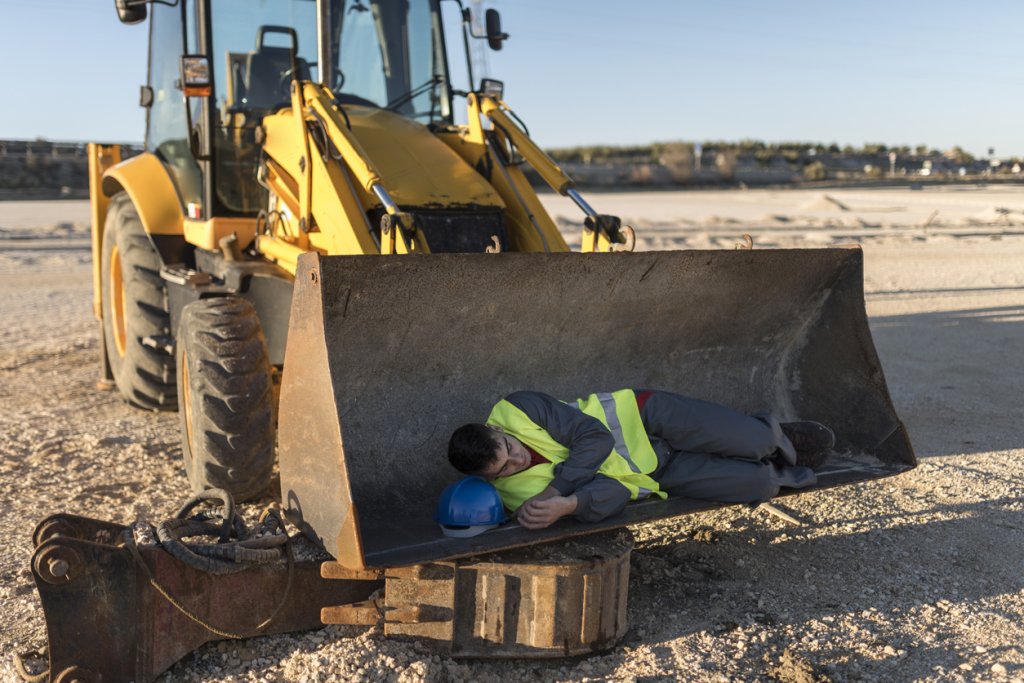Fatigue at Work Safety Talk
Being tired on the job can be a huge hazard in construction. If you cannot fully function and perform yours tasks safely and correctly, you are putting yourself and your coworkers at risk.
In the construction field, workers who haven't gotten enough sleep can make crucial mistakes and cause serious injuries when operating machinery or working with dangerous tools. This is why it is important to know the signs of fatigue as well as steps you can take to prevent it.
What is fatigue?
Fatigue is defined as extreme tiredness resulting from mental or physical exertion or illness. In simple terms, it is the feeling of being tired or exhausted.
Fatigue can leave workers performing at lower levels and expose them to a higher risk of injury.
Fatigue in the workplace statistics
Fatigue can have disastrous consequences in the workplace, especially in the construction, industrial, and manufacturing sectors. When a worker's alertness level is affected, the rate of errors dramatically increases and these mistakes can result in serious injuries or even death.
Here are some alarming statistics about workplace fatigue:
It is recommended that you get at least 7-9 hours of sleep each night, but about one third of adults average six hours of sleep a night or less.
Being awake for over 16 hours or getting less than 5 hours of sleep at night has similar effects as being intoxicated. Some levels of fatigue can be equated to blood alcohol levels. For instance, 18 hours with no sleep is comparable to a 0.05 BAC.
Injuries occur over three times more often in workers that have less than 5 hours of sleep per night. Additionally, 13% of all workplace injuries can be traced back to sleep deprivation.Causes of Fatigue
Fatigue at work is more than just a feeling of being sleepy. It is a cocktail of feeling exhausted, low energy, sleepiness, and muddy thinking.
Fatigue at work can have many causes. Factors may include:
Too many demands at work or home
Medication
Other health problems such as depression or anxiety
Sleep disorders
Bad shift scheduling
Symptoms of fatigue
Common fatigue symptoms include:
Feeling tired even after you slept
Reduced eye-hand coordination
Slow reflexes
Short term memory problems
Inability to concentrate
Blurred or impaired vision
A need for more sleep on days off
If you are suffering from fatigue at work it is important to let your supervisor know immediately.

How to prevent fatigue at work
Everyone gets tired at work occasionally. But if you find that mental or physical exhaustion is a persistent problem for you, it is time to look at ways to prevent fatigue. You first need to figure out the cause of your fatigue, then determine an adequate solution.
Some ways to combat fatigue include:
Get plenty of rest. It is recommended you get at least 7 hours of sleep each night. If you are getting less, try going to bed earlier or adjusting your bedtime routine.
Understand the side effects of your medications. Talk with your doctor and make sure the medications you are prescribed will not interfere with your ability to work.
Take care of your health. Addressing your health concerns can make you feel better at work and at home.
Eat a better diet. Food is fuel for your body. You need proper nutrients to operate and stay healthy. You cannot function without a well-balanced diet. Eat well and drink water to stuy hydrated throughout the day.
Exercise. Staying active outside of work is a vital way to stay healthy. It could be a 30-minute walk daily or going to the gym. Exercise will help you fight off fatigue because you will have more energy throughout the day.
How to manage fatigue
If you are feeling fatigued at work, here are a few fatigue management practices you can try in the moment:
Try eating healthy snacks that can supercharge your body and brain and help you gain energy. This can include bananas, yogurt, blueberries, avocados, salmon, and leafy greens.
If you are dehydrated, you will also be tired and sluggish. It is best to drink water. Remember that caffeine will dehydrate you, so caffeinated beverages are not a replacement for proper hydration or sleep.
Feeling like you cannot keep your eyelids open anymore? Try some stretches or go for a short walk.
While on your lunch break, try to take a 20-30 minute power nap. This can increase your alertness.
If you are feeling fatigued at work, talk to your supervisor. You may need to take a break to recharge your energy levels. You should not operate heavy machinery or any tools when you are feeling tired.
The risk of injuries to yourself and your coworkers drastically increases when you are working with a cloudy mind and tired body. If you are having frequent trouble getting sleep at night or figuring out the cause of your fatigue, talk to your doctor.
Find and schedule topics faster
Raken's toolbox talk app makes it easy to choose from a pre-loaded library (or upload your own), then schedule and assign topics for any project. We'd love to show you how in a demo and get you started on a free trial.